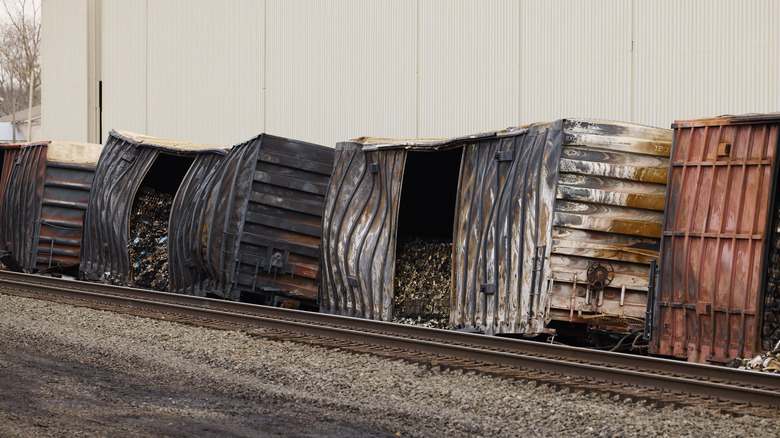How Ohio's Train Derailment Could Impact The US Food Supply
Residents of East Palestine, Ohio have been dealing with the fallout of a massive, hazardous train derailment within their town for nearly two weeks, and questions remain about the long-term ramifications of the accident. According to The Washington Post, a freight train carrying tankers of toxic chemicals derailed on February 3 in the town near the Ohio-Pennsylvania border. The accident was reportedly triggered by a failed wheel bearing that caused 50 train cars to derail. Eleven of these were carrying hazardous chemicals that included vinyl chloride, which leaked and caught fire.
As firefighters attempted to contain the blaze, local residents were urged to evacuate their homes to avoid breathing in potentially lethal fumes from the burning materials. On February 5, changes in the weather caused the railroad company, Norfolk Southern, to fear an explosion in the burning cars, and a controlled release and burn of the remaining chemicals were planned. More than 1,500 people were ordered to evacuate from the immediate area and residents of neighboring towns were advised to stay indoors, according to ABC News. The burning of the chemicals sent plumes of black smoke into the air and residents were not allowed to return to their homes until three days later when the burning stopped and chemical fumes had dispersed or evaporated. The town is currently undergoing an extensive cleanup under the supervision of state officials and both teams from Norfolk Southern and residents are encouraged to report any concerns the accident has on people or animals.
Food supply worries
While authorities say the immediate danger has passed, there are still concerns about the long-term consequences of the disaster. The Washington Post reports that runoff from the derailment and fire has killed at least 3,500 fish in nearby streams, which has led to concerns about environmental dangers for residents, livestock, and crops in a significant food-supplying state.
While Food Safety News notes that most of the vinyl chloride, which is a carcinogen in high concentration, has likely been broken down by sunlight and evaporated out of topsoil and streams, it could last much longer in groundwater it might have leached into. Testing of local water and air is ongoing, though the latest government update suggests long-term effects on humans and farm animals should be minimal, as the chemicals are no longer leaking (via Lancaster Farming). The substances do not build up in animal tissues if inhaled, so consuming meat or eggs from animals near the site will not cause health problems in humans. Additionally, chemicals remaining in streams will be significantly diluted over time and can reportedly be filtered out at local water treatment facilities.
The news is mostly good from a food-supply standpoint, Ohio being a major supplier of corn, pumpkins, bell peppers, tomatoes, and cucumbers, as well as chicken and animal bi-products like cheese and eggs. Additionally, the train wreckage has been cleared from the tracks, allowing shipping traffic to resume along the line, avoiding further supply-chain complications, though the situation is ongoing.

